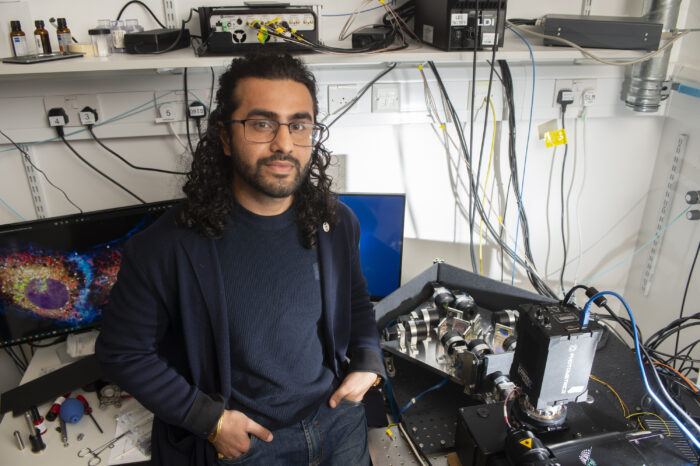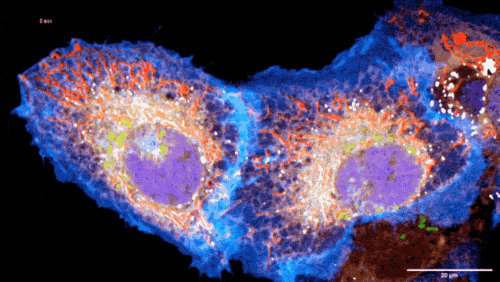
Akaash Kumar has been announced as the 2024 recipient of the Royal Microscopical Society’s Early Career Award. The award is given to recognise the achievements of early career researchers in their contributions to the fields of microscopy, image analysis or cytometry.
Akaash recently concluded his Ph.D., working with Emmanuel Derivery and James Manton in the LMB’s Cell Biology Division and has now begun a postdoctoral placement. The RMS Award recognises his impressive work during his Ph.D. to develop a novel, versatile imaging system capable of rapid live-cell imaging of up to eight biological components simultaneously.
Akaash’s impetus to reimagine microscopic imaging systems was to solve the problem of visualising endosomal sorting, a complex process whereby cellular cargoes are delivered to required destinations or marked for degradation and recycling. This process happens incredibly quickly in 3D (within seconds) so is very difficult to image in real-time. Attempts using existing technology were limited by low temporal resolution and spectral overlap, making it impossible to decipher the roles of the many components involved in this process.
The multispectral imaging system and software developed by Akaash allows for rapid live-cell imaging of up to eight simultaneous biological targets with high specificity and contrast – a marked improvement on the previous limitation of three labels. The new system utilises carefully positioned dichroic mirrors and cameras to capture the emitted light from many fluorophores simultaneously. This spectrally overlapping data is then interpreted using a new spectral unmixing algorithm designed to handle noisy signals associated with live imaging. Akaash has developed this technology to be compatible with any camera-based microscope to make this imaging advancement more widely available. To this end, a second system has been developed with just two cameras and readily available parts, so it can be used by researchers to assist in numerous biological investigations.

To assist his investigations into endosomal sorting, Akaash used this microscope to look at the transportation of cellular cargoes. He worked with David Baker’s group at the Institute for Protein Design, University of Washington, who designed monovalent receptor binders which bind to their cargo targets and could be labelled with bright dyes, allowing for easy identification and multiplexing using the multispectral imaging technology. This has allowed Akaash to directly image many receptors during endosomal sorting events in live cells for the first time, enabling the allocation of a timescale to this phenomenon.
Before joining the LMB, Akaash worked at the Wallace H. Coulter Department of Biomedical Engineering at the Georgia Institute of Technology and Emory University, where he developed novel bioprocessing technology for stem cell manufacturing and assisted with teaching undergraduate and graduate teaching. He received a B.Eng. in Biochemical Engineering from University College London and an M.Sc. in Advanced Chemical Engineering with Biotechnology from Imperial College London.
Akaash’s work has previously been recognised with the Ph.D. Student Award for Applied Research from the Cambridge Society for the Application of Research (CSAR) and Best Talk Awards at the Warwick-Cambridge Quantitative Cell Biology Meeting (2024) and Frontiers in Bioimaging (2022) conferences.
Further references
Multispectral live-cell imaging with uncompromised spatiotemporal resolution. Kumar, A., McNally, K.E., Zhang, Y., Haslett-Saunders, A., Wang, X., Guillem-Marti, J., Lee, D., Huang, B., Kay, R.R., Baker, D., Derivery, E., Manton, J.D. BioRxiv (N.B. Preprint – not yet peer reviewed)
Emmanuel Derivery’s group page
James Manton’s page